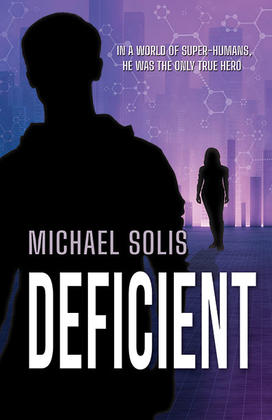Michael Solis ’07 Explores Deep Themes in Whodunit Mystery
The book: Michael Solis’ debut novel Deficient (BHC Press) tells the story of Alejandro Aragon, a powerless 15-year-old living in a society of gifted individuals. In this futuristic world, free from discrimination based on race, class, and sexual orientation, Alejandro’s dream is to graduate and pursue a career in the capital. That plan is interrupted when his best friend Yalamba is kidnapped in a hate crime against her ability as an artist — and Alejandro is believed to be the suspect. It’s a race for Alejandro to both save his friend and discover who he truly is. Deficient is nominated for a number of awards including the 2024 Pushcart Prize, International Latino Book Award, and the PEN/HEMINGWAY AWARD for Best Debut Novel.

The author: Michael Solis ’07 is a graduate of Princeton, the University of Galway, and Central American University. He has spent the past 16 years working in human rights, development, and humanitarian action across Asia, Africa, and Latin America and serves as Trócaire's global director for partnership and localization. A Henry Luce Scholar and U.S.-Ireland Alliance George Mitchell Scholar, Michael has master’s degrees in human rights law and gender studies. While traveling, he fell in love with telling thought-provoking stories based on his personal experiences. Deficient is his debut novel. He currently lives in Nairobi.
Excerpt:
Hyenas and Cowards
Life never goes the way you want it to when you’re a Deficient. It’s a lesson I learned long ago—seven years ago, to be exact. Now, at fifteen, it’s one I’m reminded of every morning on the way to the academy.
My forehead cools as I rest it against the smooth glass of the shuttle bus window. I don’t bother paying attention to the hovering vehicles outside or the bright blue lights of the highway. Instead, I watch raindrops race to the bottom of the foggy window.
Some drops are bigger than others. They gobble up the smaller ones as they slide down, but the big ones pay the price for their size. After absorbing so many of the tiny droplets, they grow too large to sustain themselves. They succumb to gravity, falling from the window to their deaths on the illuminated highway below.
Splat!
My thoughts snap back to my surroundings, and my eyes dart to the biggest droplet of all—a gooey glob of saliva that’s splashed near the upper corner on the inside of my window.
I grit my teeth. Idiots. The fourth-year Atlases sitting across the aisle cackle away. “You missed, moron!” one says. “I won’t next time,” the second replies.
My skin prickles with goose bumps—a familiar sign of fight or flight. But fleeing isn’t possible, and fighting won’t help. The evolutionary theorists should have come up with a third option for a Deficient who’s backed into a corner. With their enhanced strength, Atlases can do whatever they want with someone like me.
“Aren’t you gonna stand up for yourself, defective loser?” the third one asks. I fail to answer the question—a trick that usually buys me some time, though it tends to generate immediate resentment. “Say something, defect!”
“He’s so stupid he can’t even talk,” says the first. Ironic, since his brain is dimmer than a black hole. Knowing I can only remain silent for so long, I let out a deep sigh before turning away from the window to stare at them. “Something,” I mutter.
Their eyebrows narrow, and their words transform into snarls. They remind me of a pack of rabid dogs. “This Deficient fecker thinks he’s smart.”
The second Atlas inhales and releases another wad of phlegm that spurts out so fast I can’t dodge it. It hits me hard on the cheek, forcing me to turn toward the window once again. Splat! Splat! Splat! Splat!
I raise my arm to block the onslaught of spit. It ends after a few seconds. The Atlases laugh and give each other high fives. I wipe at the warm, sticky moisture on my face with the sleeve of my academy jacket. The contrast between the gooey yellow mucous and black fabric makes my stomach churn. I want to hurl every curse I know at the Atlases, but I bite my tongue. Provoking them was a stupid mistake. Acting on my emotions never ends well.
Two years until I’m out of Achewon. It feels like forever, but it will come eventually. Counting down the hours left in the day usually helps—a reminder that time is, in fact, passing—though it’s a little early in the morning to start doing that.
The shuttle bus comes to a stop. The Atlases get up and laugh their way down the aisle. Quieter kids look away as they rush past my seat. None are willing to stand up in my defense, let alone look me in the eye. They scamper to the exit, panicking as if the shuttle bus has suddenly gone ablaze.
They’re hyenas and cowards, all of them. Once all the students have passed, I slide my backpack over my shoulder and make for the door. The shuttle bus driver looks out the window instead of rewarding me with a goodbye or wishing me a great day like he does the other students. I don’t mind. I’ve had seven years to get used to not being acknowledged.
The shuttle bus lifts into the air and starts to accelerate before I can dismount. Thanks, Mr. Shuttle Bus Driver. I jump. My legs wobble when I touch the ground, but my landings seem to be getting better. I take in the dampness of the November air before I see it—the place I hate more than any other on this planet.
Achewon Egalitarian Academy. I shudder. Seven hours down. Only seventeen more to go.
From DEFICIENT by Michael Solis with permission from BHC Press.
REVIEWS
“An attention-grabbing plot-driven story that tackles themes of belonging.” — Kirkus Reviews
“A superb debut novel filled with humor, suspense, action, mystery, and many surprises. The ideas in the book have a lot of potential as a series, and the story will appeal to many beyond its core young adult audience. Well done, and worth the read!” — Queer Sci-fi












No responses yet